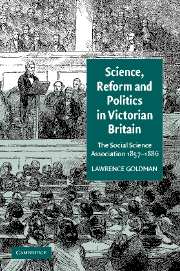Book contents
- Frontmatter
- Contents
- List of illustrations
- Acknowledgements
- Note on citations in the text
- List of abbreviations
- Introduction: the contexts of the Social Science Association
- Part I POLITICS
- Part II REFORM
- Part III SCIENCE
- Part IV DECLINE
- Conclusion: The Social Science Association and social knowledge
- Appendix I The founders of the Social Science Association, 29 July 1857
- Appendix II Social Science Association Congresses, 1857–1884
- Appendix III Presidents of the Social Science Congresses, 1857–1884
- Appendix IV Departmental presidents, 1857–1884
- Select bibliography
- Index
Introduction: the contexts of the Social Science Association
Published online by Cambridge University Press: 22 September 2009
- Frontmatter
- Contents
- List of illustrations
- Acknowledgements
- Note on citations in the text
- List of abbreviations
- Introduction: the contexts of the Social Science Association
- Part I POLITICS
- Part II REFORM
- Part III SCIENCE
- Part IV DECLINE
- Conclusion: The Social Science Association and social knowledge
- Appendix I The founders of the Social Science Association, 29 July 1857
- Appendix II Social Science Association Congresses, 1857–1884
- Appendix III Presidents of the Social Science Congresses, 1857–1884
- Appendix IV Departmental presidents, 1857–1884
- Select bibliography
- Index
Summary
The National Association for the Promotion of Social Science, known to contemporaries as the Social Science Association, was founded in London on 29 July 1857 and held its inaugural congress in Birmingham some weeks later in early October. Thereafter, its annual meetings captured national attention for a generation. Held in all the major cities of Britain and attended by thousands, they were a focus for social and institutional reform in mid-Victorian Britain. The Social Science Association was an open forum for the discussion of all aspects of social policy and was variously referred to as an ‘outdoor parliament’, a ‘supplementary parliament’, an ‘unofficial parliament’, an ‘amateur parliament’, and a ‘parliament out of session’, staffed, according to The Spectator by the ‘volunteer legislators of Great Britain’. In the words of Lord Brougham, its first president, it was ‘to aid legislation by preparing measures, by explaining them, by recommending them to the community, or, it may be, by stimulating the legislature to adopt them’. After participating in its first two congresses, Lord John Russell, the mid-Victorian prime minister, described it as ‘a yearly Council for national and local government to go by’. According to John Stuart Mill, ‘it really brings together persons of all opinions consistent with the profession of a desire for social improvement’. The Times saw it as ‘a centre for the communication and interchange of ideas on current topics of political and social interest’.
- Type
- Chapter
- Information
- Science, Reform, and Politics in Victorian BritainThe Social Science Association 1857–1886, pp. 1 - 24Publisher: Cambridge University PressPrint publication year: 2002



